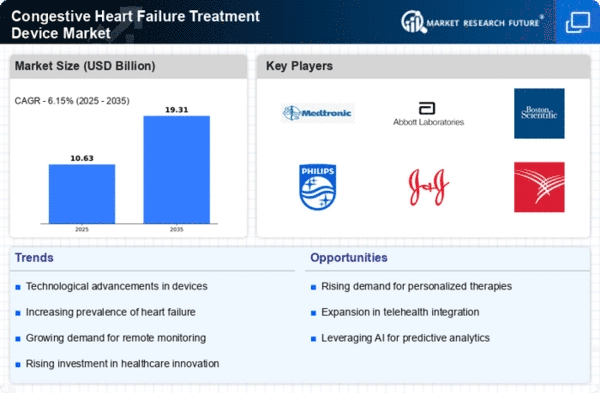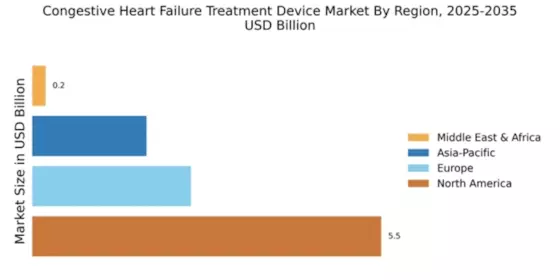North America : Market Leader in Innovation
North America holds the largest market share in the Congestive Heart Failure Treatment Device Market, valued at $5.5B in 2025. The region's growth is driven by an aging population, increasing prevalence of heart diseases, and advancements in medical technology. Regulatory support from agencies like the FDA has accelerated the approval of innovative devices, enhancing patient outcomes and driving demand. The competitive landscape is robust, with key players such as Medtronic, Abbott, and Boston Scientific leading the market. The U.S. is the primary contributor, supported by a strong healthcare infrastructure and significant investments in R&D. The presence of established companies fosters innovation, ensuring a steady supply of advanced treatment options for heart failure patients.
Europe : Emerging Market with Potential
Europe's Congestive Heart Failure Treatment Device Market is valued at $2.5B in 2025, reflecting a growing demand for innovative solutions. Factors such as an increasing elderly population, rising healthcare expenditure, and supportive regulatory frameworks are driving market growth. The European Medicines Agency (EMA) has been instrumental in facilitating the approval of new devices, enhancing patient access to advanced treatments. Leading countries include Germany, France, and the UK, where significant investments in healthcare technology are evident. Major players like Philips and B. Braun are expanding their presence, contributing to a competitive landscape. The focus on improving patient outcomes and reducing hospital readmissions is shaping the market, making Europe a key player in the global heart failure device sector.
Asia-Pacific : Rapidly Growing Healthcare Sector
The Asia-Pacific region is experiencing significant growth in the Congestive Heart Failure Treatment Device Market, valued at $1.8B in 2025. Key drivers include increasing urbanization, rising disposable incomes, and a growing awareness of heart health. Governments are investing in healthcare infrastructure, and regulatory bodies are streamlining approval processes for new devices, fostering market expansion. Countries like Japan, China, and India are at the forefront, with a rising prevalence of heart diseases necessitating advanced treatment options. Major companies such as Terumo and LivaNova are expanding their operations in this region, enhancing competition. The focus on affordable healthcare solutions and innovative technologies is expected to drive further growth in the coming years.
Middle East and Africa : Untapped Market Opportunities
The Middle East & Africa region represents a nascent market for Congestive Heart Failure Treatment Devices, valued at $0.21B in 2025. The growth is driven by increasing healthcare investments, a rising prevalence of cardiovascular diseases, and a focus on improving healthcare access. Regulatory bodies are beginning to establish frameworks to support the introduction of advanced medical devices, which is crucial for market development. Countries like South Africa and the UAE are leading the way, with growing healthcare infrastructure and increasing awareness of heart health. However, the market remains competitive, with opportunities for both local and international players. Companies are focusing on partnerships and collaborations to enhance their market presence and address the unique healthcare challenges in the region.

















